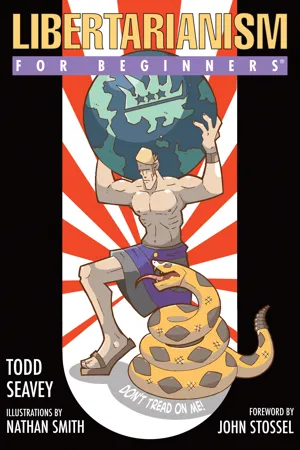
- 176 pages
- English
- ePUB (mobile friendly)
- Available on iOS & Android
Libertarianism For Beginners
About this book
Libertarianism isn’t about winning elections; it is first and foremost a political philosophy—a description of how, in the opinion of libertarians, free people ought to treat one another, at least when they use the law, which they regard as potentially dangerous. If libertarians are correct, the law should intrude into people’s lives as little as possible, rarely telling them what to do or how to live.
A political and economic philosophy as old as John Locke and John Stuart Mill, but as alive and timely as Rand Paul, the Tea Party, and the novels of Ayn Rand, libertarianism emphasizes individual rights and calls for a radical reduction in the power and size of government. Libertarianism For Beginners lays out the history and principles of this often-misunderstood philosophy in lucid, dispassionate terms that help illuminate today’s political dialogue.
Frequently asked questions
- Essential is ideal for learners and professionals who enjoy exploring a wide range of subjects. Access the Essential Library with 800,000+ trusted titles and best-sellers across business, personal growth, and the humanities. Includes unlimited reading time and Standard Read Aloud voice.
- Complete: Perfect for advanced learners and researchers needing full, unrestricted access. Unlock 1.4M+ books across hundreds of subjects, including academic and specialized titles. The Complete Plan also includes advanced features like Premium Read Aloud and Research Assistant.
Please note we cannot support devices running on iOS 13 and Android 7 or earlier. Learn more about using the app.
Information
Table of contents
- Cover Page
- Title Page
- Copyright
- CONTENTS
- FOREWORD
- INTRODUCTION
- 1. The Basics
- 2. Libertarianism in Action
- 3. Economics
- 4. Classical Liberalism
- 5. Modern Libertarianism
- 6. Twenty-First-Century Factions
- 7. Anarcho-Capitalism
- 8. Ten Dilemmas for Libertarians
- 9. Major Libertarian Schools of Thought
- Frequently Asked Questions
- Chronology
- Glossary
- FURTHER READING
- WEBSITES
- ABOUT THE AUTHOR
- ABOUT THE ILLUSTRATOR